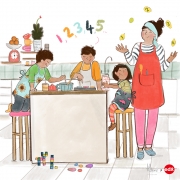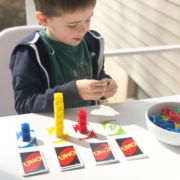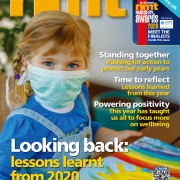John Adams, Dad Blogger, Journalist, Entrepreneur In Conversation with Edx Education
John Adams, Dad Blogger, Journalist, Entrepreneur In Conversation with Edx Education
Episode – 26- Heather Welch, Edx Education In Conversation with John Adams, Dad Blogger, Journalist, Entrepreneur In Conversation with Edx Education.
John is founder Dad Blog UK, Communications specialist and most important a father. @dadpoduk
Today we are chatting with John on working from home, parenting and family life from balancing home learning to how the last 12 months has affected your family.
Episode – 26- Heather Welch, Edx Education In Conversation with John Adams, Dad Blogger, Journalist, Entrepreneur In Conversation with Edx Education.
Heather Welch (00:01)
You’re listening to education experts with Edx education. Education is evolving. Join Heather Welch from Edx education, chatting with teachers, psychologists, parents, authors, creatives, and other tons of experts to keep up with the trends and what’s happening from around the globe. This podcast series Edx education discusses, home learning, school readiness, being creatives, changing in education, discussing what’s next hands-on learning. Or as we like to say, learning through play
Heather Welch (00:34)
Welcome everyone. I’m Heather Welch from edx education. And today we’ll be in conversation with John Adams. John is the founder of the dead blog, UK, a communication specialist, and most importantly, a father, John originally gave up his career in communications to look after his children.
However, over the years, he’s managed to build a successful business back in his career as a parenting blogger, winning many awards for his blog and podcast. Today, we’re chatting with John and working from home parenting and family life from balancing home, learning to the last 12 months and how it’s affected your family. Welcome, John. It’s wonderful. You could join us today. Can I ask you to introduce yourself to our listeners and tell them about your passion for changing the stereotype of men and women’s roles?
John Adams (01:18)
Thanks for having me on the podcast. I’m always keen to talk about men’s and women’s roles. So it’s, we’ve, you’ve done a wonderful introduction. Anyway, so I became the main care for my kids, but 10 years ago now, but the two daughters I’ve got Helen who’s 11 and Izzy, who is eight. And see if we, if we go way down into the midst of time, hadn’t wasn’t nursery, full-time my wife and I sort of missed a couple of sort of pivotal milestone moments.
So when she was about 18 months old, I had a conversation with my wife and suggested that actually I leave my job and concentrate on family and home while my wife would work full time. And it was a very unemotional, brutally practical decision, you know, she had the better career prospects more. So it just seemed to make sense.
John Adams (02:10)
So we did that and haven’t looked back up until that point. I think I’ve sort of lived quite a privileged life. You know, I can’t pretend otherwise are quite privileged background that I come from. And I found very quickly that I was facing all sorts of subtle sexism because I was the world is, is not set up to accept men looking after children, especially young children. And so I started blogging about my experiences at that blog, uk.com and to my amazement, people were quite keen to read about what it’s like being a man, holding the babies basically to this day, I’m still the kid’s main carer, but I sort of fit what I do around family life.
Very keen to challenge gender stereotypes and roles. I will not tolerate anyone that caring or caring for children is women’s work. It isn’t, and it’s not a woman’s role fathers should be heavily involved with their children’s lives. And likewise, I just don’t believe we’re ever going to get gender equality in the workplace for women until we have gender equality in the home for men.
Heather Welch (03:23)
That’s very interesting, actually, it’s very true as well. And it’s very practical, but I mean, you’ve been working from home flexibly really and been main carer since what, 2011 was it?
John Adams (03:33)
It was about 2011 and yeah, my status has changed. And I initially actually started working part time. And then after a while I did actually stop working altogether for a bit. By that point, my blog was sort of bringing in a few quid and, you know, I sort of thought, Oh, well, you know, let’s see if I can actually make money doing this. And then from there on the sort of blog group, yeah. I sort of slipped into becoming a work from home dad.
But the very interesting thing is if your bail almost certainly my experience when I gave up full-time work, other people started calling me a stay at home. Dad. I never called myself a stay-at-home dad, but I got caught it so often that delay from just sort of stuck. Had to start calling myself a stay at home dad.
Heather Welch (04:39)
That’s very true. Especially in this day and age when we can, you know, work from home or we can find flexible working. It’s not the nine to five, you know, we say Bundy clock in Australia, which is like that clock in clock out mentality anymore.
It’s more on productivity than being at that desk and sitting there. And even if you’re doing nothing, just sitting there and being seen, one thing it’d be interesting to know is how has the stereotypes changed over the last 10 years? Cause I mean, you’ve really, you’ve been in the hot seat for 10 years, 10 years ago. It probably was a little bit more unheard of in the UK, especially because it is quite a traditional society at times, traditional values.
John Adams (05:17)
The UK is an interesting situation. Actually we are, I feel more advanced than say some of our European neighbors, France, Spain, Italy, I think those sorts of nations when it comes to caring roles within the home and sort of gender equality, generally, I think they are, you know, we’re ahead of them. But then, you know, sort of look at the usual suspects in Northern Europe, you know, Iceland, Denmark, Sweden, all those nations, their streets out of the UK.
So the UK sort of sits in the middle the way I always put it is when I a father, the question that was asked him men was, is he going to be a hands on dad? I think today we have moved on to a point whereby the question asked to fathers is how hands-on is he? So I think we have seen progress and there’s more to do, but we’ve definitely taken strides in the right direction.
Heather Welch (06:23)
No, I see. I suppose one of the, I know this sounds really silly, but one of the main things you find is when you have a baby and they’re quite young and just say you’re out to lunch or anything like that 10 years ago, you wouldn’t even have a baby change areas where the men could go would always just be in the women’s change room. But now they’ve sort of moved on to this family changing more, even in both. So I suppose I know that seems like a very trivial thing, but at the time, it quite an important change. You know, it’s only very small, but listen, I love what you mentioned on your post.
The other day, you’re on an international women’s day panel discussion. And you’re asked about this and you said, your position is if you want to change men’s behavior, you have to include them in the discussions. So I would hate for international men’s day to be female free zone. We can only change the world for the better if we work together. I really enjoyed that. I think that’s an amazing, that’s very good quote, actually, and a very good understanding for men to realize, and for women as well, to realize that actually we all need to encompass each other, which is a nice thought as well.
John Adams (07:25)
I wrote that actually, because I had seen someone, I would say write a rather unthinking comment on social media. They were basically saying that men should always give up a role in a panel discussion on international women’s day for woman was available.
I can’t agree with that approach. We have to work together. And actually there are issues that women face that are very often written off or all classes women’s issues, which arms, and they will never change. And childcare is a classic one. These issues will never change unless men are included in discussion and men realize that they’ve got a role to play in changing these issues. And if you freeze men out, if we’re going to get involved, they’re never going to show any interest. So
Heather Welch (08:15)
It was like a very, narrow-minded like the in business, that old silos approach. So you know that no one works together and you just pass the piece of paper from one silo to the other, and it doesn’t work in this day and age. It’s got to be more of an open communication approach. So yeah, that does definitely sounds like more of a narrow-minded approach, but listen, Don, the other one is I’d love to hear what you did before your previous career before founding dad blog UK, because I know that you’re in communication, you’re in the media a lot. You’ve worked with LinkedIn and a whole lot of other, these big social networks. I’d love to hear what you did before founding your dad blog UK.
John Adams (08:51)
Well, if we go right back to the message type, I was a, a local news reporter. Then realizing I was never sort of going to make it quite as a big Germany’s global PJ role called John Switzer. Made the move over for a guy in his mid twenties actually, and landed on my feet. Landed a job with the travel trade publication. So it’s kind of business journalism, but it was also travel journalism. So I was traveling the world at someone else’s expense, which was dream job.
It was interesting. I was actually working there when nine 11 took place. So I was dispatched to New York a few weeks after nine 11 had happened to sort of write about the clearer operation. And New York is a city that I love. It was horrible to see what in, but anyway, getting back to the question, you know, I then moved out to sort of work in a charity PR and craze I government PR and communications, and ended up eventually working in communications rather than public relations for N a no longer existent financial regulator before I gave that up to sort of concentrate on family and home.
John Adams (10:12)
So my, my background is, yeah, media hall, really? I guess, mostly
Heather Welch (10:20)
You tried all areas amount of many talents. Look, what was the inspiration when you’re finding that blog? Was it because you came home? Was it the interesting opinions people had at, you know, you could say, stay at home dad or you could, why, what was the inspiration?
John Adams (10:39)
I have a few different experiences. There was a local woman set up a childcare facility to look after children and a local newspaper ran a ginormous article on what sort of was doing. Couldn’t quite figure out why that dedicated so much space to me. That’s the journalist in me coming out
John Adams (11:07)
And she didn’t once mention fathers. I actually bumped into this woman. She was talking about the service she was providing. I sort of came to the conversations that and your services for that. And she was really quite dismissive, which is just one example of the kind of sexism I face. I mean, there was another time when I was out with my it’s actually my junkie stills up there and I was bottle feeding her and a cafe.
It’s just one of those moments where I sort of look back right now. And I think, what did I not tell this woman to F off frankly, and an older woman lifted my child out of my arms. I was bottled for you to kind of started parading her around this cafe. So look, this man is babysitting. This man is babysitting. Her adult daughter was actually her and her daughter just looked horrified and said, no, mum, he’s just looking after his kid.
John Adams (12:00)
And then, you know, another time, a couple of times actually I’ve had a few experiences in the healthcare sector where, you know, I’ll be told I’m babysitting and on one memorable occasion, when other kids were not violations and the nurse actually started physically looking around the room from my wife, it was just a worry that I can bring my kid to a routine inoculation appointment without my wife. And he doesn’t need to be here.
Men do get treated differently. I’m afraid and all these little things stacked up. And I thought, right, so I’m not taking this anymore. So I started blogging about it. I set myself a challenge actually, when I started the blog, I said, I just want this blog to achieve something in three months. If it hasn’t, I’m going to stop. And within three months I was actually to charity reception at 10 Downing street. You know,
Heather Welch (12:49)
I was reading this, this is getting, this is getting somewhere, but you’ve also got many discussions online. I had to look on BBC and all sorts of things, chatting about maybe stereotypes and everything. So can you elaborate on those?
John Adams (13:04)
There’s a guy called Glen pool. He’s quite a well-known men’s rights campaigner who, I mean, he’s British, but he’s actually now based out in Australia, lost chatting to him once and saying like, I just didn’t think I was doing anything particularly special. I was just looking after my kids. I know this is going to sound dreadful, a big headache. And then what you’re doing is you are really, really challenging gender stereotypes.
He said to me, just think about how many politicians and journalists that you’ve actually spoken to. And when I kind of thought about it, that he’s, he’s actually right. There is huge interest in guys who take on the main caring role because there are so few of us and I didn’t really appreciate it. So I still don’t appreciate it really. I really don’t get what all the fuss is about. All you’re doing is looking after your own children.
John Adams (13:56)
But if people are going to show an interest in what I’m doing, I will speak publicly because I just want it normalized. And you mentioned the international women’s day panel discussion I was involved with yesterday. One of the individuals that took part in that, since she over heard someone, her husband’s workplace, he was saying that he couldn’t do a particular meeting because he had to go to nursery, pick up his kids. She said it really greatly with her because the person on the other end of the call was saying, well, daddy, that’s really good if you pick your kid up, well, I’m sorry, you don’t deserve a medal for this.
Ithink that’s actually quite an interesting point to make is that when men do go out of their way to feel the caring role, we very often are for doing so. That always makes me feel awkward, but at the same time, it isn’t normalized either we have to normalize this. So, yeah, I’m, you know, I have taken in academic studies, I have spoken to journalists, I’ve written pieces for books and so on. It’s not only going to slowly go out of my way to, to attract that attention. But these things do sort of tend to come to me because people are so interested in a man who is the main character, his kids, and he was prepared to speak publicly about it
Heather Welch (15:23)
To a degree you’ve then also on the other hand, being able to build a business and become quite successful within the timeframe that you have, which is different as well. So you, yes, you took on the home caring and as the main we call it the primary or the main carer, but then you also, sorry, parent, I shouldn’t say carer called caregiver parents. And then you’ve been able to build this business, which is in your place to your skillset of being a communications specialist or journalist as well.
It’s interesting. When I had my first born, we were still living in Australia at the time and one of the big banks, their Westpac implemented, and it was sort of groundbreaking. They implemented that men were allowed to take six months parental leave after the woman’s maternity leave was up and they would support it and not actually pay the first three months full pay.
Heather Welch (16:14)
So this was a really groundbreaking at the time, 10 years ago. And one of our friends took it and he had a lot of backlash actually, so it’s available, but he had a lot of backlash from his peers for taking it and then found it hard to get back into, to a degree, the same role and being pushed up the ladder the same way. So it was a really interesting for him to, he took it for the first child, but not for his second child.
He realized that he probably learned his lesson and maybe he shouldn’t take it at the time, which was actually quite sad because he did have such a wonderful time, you know, imagine having that you had a year at home for the wife and then the husband managed to get six months, half pay, which is, I mean, amazing, but this not another topic, John, I want to know how have you survived the last 12 months children have probably gone back one and a half terms, probably two terms. If we’re lucky in the last 12 months, how are you going with home learning?
John Adams (17:07)
It’s actually been a particularly interesting one because our eldest daughter had an actually started secondary school. So the poor kid has left primary education and gone into a secondary school a year seven, you know, the usual school transition period where parents would be invited into actually, you know, see the school, meet the PTA, where the kids would actually have transition days and what they did or would usually do at her school as it actually pair the year sevens up with a year 12 or year 13, sort of sick four months, of course, that breaks the bubbles system. So they’ve had absolutely none of that. And I actually did the maths give or take a few days for illness and type of thing. I think I worked out that my eldest daughter has since last March, she had about, I think it’s 94 face-to-face teaching days.
John Adams (17:58)
And my youngest daughter is that 77. So it’s really interesting if you actually sit down, do the mass it’s, our kids have not been in school much at all. How have I found the home learning? Well, last year they were both at the same school at that point. And while the school had made preparations, they could see what was coming. It was more a case of homeschooling.
You know, I was having to sit down with the kids and get a lot more involved and I was, you know, to fit in time. I was printing off twinkle activity sheets. This time around, since last December, actually both schools had a much better remote learning in place. Certainly my eldest daughter, pretty much every other lesson was actually a live streamed lesson. There was much greater prepared work or videos for, to, to engage with them, that type of thing.
John Adams (18:51)
So actually this last lockdown I’d been in a lot, lot more organized, you know, washed dressed or sort of half, six each morning, making sure that I’m ready to go. I think the biggest thing I’ve been actually has been a it support. I’ve not actually had to get particularly involved with their actual learning. In fact, both schools said you set them up at the beginning of the day and then you step back as it, there’ll be very clear that we’re the teachers. We want to do the, the educating. But yeah, I mean, it’s, it’s been interesting.
Heather Welch (19:26)
That’s locked down. Number three, is that your schools were empowering the children to take a focus of their learning rather than the parents, which is very good. Yeah.
John Adams (19:35)
Yes, yes. It is. My actual concern is about their social development. I can see, you know, certainly had a GS 11, her station, child development. She’s supposed to be out with her friends taking risks, which, you know, may involve getting in trouble from time to time. But I’m afraid it’s just part of growing up. And she’s had none of that. Yes. The kids have been able to keep in touch with their friends using various online means, but it just isn’t the same when it comes to education.
Actually, no I’m not concerned. And the reason I’m not concerned is because I’ve actually got faith in the teachers. I’ve got faith that plans will be put in place to help youngsters catch up. I appreciate I’m saying some, a position of privilege. If our kids need the extra support, my wife and I will get it for them one way or another. And I don’t want my kids worry about falling behind at school.
Heather Welch
That’s really interesting because then if you look at the McKinsey studies. Everything you know, 70% of the jobs that we have now. That our children will have aren’t even available yet. So are we teaching them to that knowledge and that creativity or are we teaching them to a, maybe a more traditional set of curriculum than what will be, what they’ll need in the future? So we never know this lockdown may bring out these some really creative and important skills that children needed.
You know, that spending time at home in a way from that rigorous classroom. They may come up with some amazing talents or it may be the opposite. Each child will be different depending on their circumstances and environment. As you’re saying, you know, your children had a really good environment around them where one of you could be with them to help them with their learning, which is very good. I have to ask. What do you think your parenting highlight has been with your children over the last 12?
John Adams (21:49)
Do you know? It would it would actually have been last summer when. We can we just think back to the glorious days of the rule of six, the star and the days when you could actually travel and meet up the six feet or under the rules? You know, we did everything within the rules, but we did actually, we traveled from the South coast of England.
We went to Wales, we went to Scotland. We a glorious couple of days actually in open in Scotland. So we went all over the place and it got so many wonderful memories.ultimately the months leading up to that, you know, when nobody was quite clear. What was going to happen a bit COVID. Whether it was going to be like some horror film, you know, we were all walking down the pavement, you know, crossing into the roads, keep out of people’s way case.
John Adams (22:44)
And you’re able to do these things at the time. The thought that, you know, the Kent Berry popped up seemingly little risk it wasn’t glorious time. It’s very interesting that the messages that are now beginning to sort of seek out from governments. You know, the politicians may not be saying it. The government advisors are like COVID is here to stay. We can expect peaks every window. We’ve all got to get used to the fact that those lateral flow testing kits are probably, they’re probably going to be as part of the family medicine cabinet as a cheapest Sablone as I think,
Heather Welch (23:22)
it’s interesting Edx educations like main office is Taiwan and you’ve had just you know under a hundred, less than a hundred cases. So it’s just a really different way that the whole system, that, how it has worked as well. With the country and how that we’ve dealt with it and, you know, has it been pan and it’s come, you know, it’s coming to be a pandemic I suppose, in this country. So it’s really interesting when I talk to head office and things like that.
They sort of think the whole thing of rule of six is quite funny. You know, are you still working from home type thing?
Have a good chuckle over it, to be honest. it’s so far away from us probably where we were, February, 2020. When we thought this wasn’t going to affect us type thing. So it’s been really interesting for our children. Last one, I’m going to ask you about a parenting tip. What’s your parenting tip to share duties from a male’s perspective?
John Adams (24:27)
Yeah. Well, there, there are a few different ways. If I’m trying to get the children to do something generally tend to find that carrot works better than steak. It’s usually then instead of pocket money things, there’ll be a baseline of pocket money. X, Y, and Zed, then you can boost your pocket money that tends to work better with our eldest child.
If I need to sort of share responsibility with my wife or something. It is a case of communication, but I also think it is a case of understanding as well. To understand there are days when she might not be able to drop everything yo collect the kids from school. This is a case of just establishing what are the realistic between the two of you in a relationship. Also actually establishing those ground rules at the very beginning of your relationship, honey?
Heather Welch (25:21)
Absolutely. I think I’ve definitely established in the ground rules. I think many people are finding that after lockdown and having everyone in the home, you know. That really intense environment, they may be establishing different rules. Let’s say, but listen, John, how can our listeners get in touch with you? What’s the best way to get in touch with you?
John Adams (25:37)
When you can find, buy a blog@dunloguk.com. And then I’ve got the podcast as well. It’s a relatively new venture that pods UK. You’ll find that on all the usual, Google podcasts, Apple podcast, Spotify Libsyn, and so on. I’m on most social media channels, ads act done blog UK. So yeah, come find me, engage with me. I’m always keen to engage with interest with people.
Heather Welch (26:07)
John, thank you so much for chatting with us today. And as John said, get in touch. He’s got so much knowledge within the industries, also communication specialists. So maybe you could work with him or whether it’s a brand or influencer. Especially on a panel or what to have a chat about stereotypes for men’s and women’s roles. Even how he survived the first few years of finding his feet. The balance of working and developing a successful business whilst being a stay at home. Dad. Thanks John. Thank you. Thanks. There are so many exciting developments happening right now in education edX
Heather Welch (26:44)
Education would love to hear from you. So do you get in touch or subscribe to our podcast. Which is available on Apple pod beans, Spotify tune-in and so many more. This podcast series is brought to you by Heather Welch from edxeducation. The we like to say let’s create lifelong learners.


 EDX Education
EDX Education  Edx Education
Edx Education  Edx Education
Edx Education  Edx Education
Edx Education  Edx Education
Edx Education 
